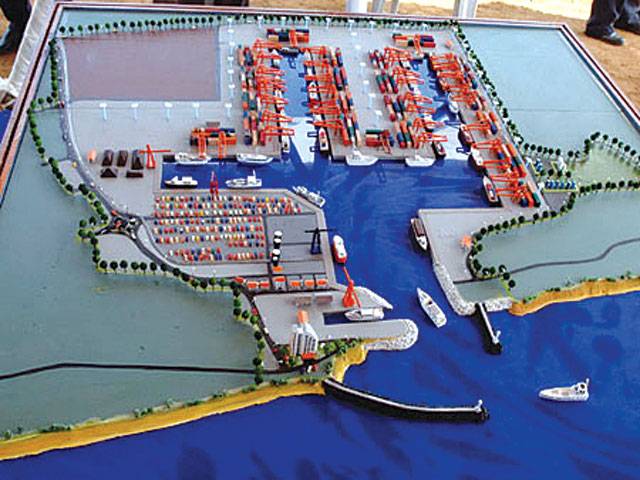QUETTA - The ‘dream city’ of Gwadar, which is also called Pakistan’s future Dubai, still awaits to emerge as a hub of business activities.
In order to accelerate the pace of business activities in the port city, the Balochistan government declared Gwadar its winter capital. However, the decision did not make any difference as no progress has been made so far to develop it as a new, modern city of the country.
The provincial government, headed by Nawab Aslam Raisani, had declared Gwadar as winter capital of Balochistan in 2010. The notification was issued in December last year, which stated that the port city would remain as winter capital of the province from December 2011 to March 2012. The main objective of the move was to boost the pace of development, while a large number of ministers and heads of various departments visited Gwadar during the period.
“Mere declaring Gwadar as a mega city or winter capital does not change the fate of local people who are deprived of clean drinking water, health facilities and education,” says Agha Hassan Baloch Advocate, a leader of Balochistan National Party (BNP). The Gwadar Port had not been built for the Baloch people rather it was an attempt to usurp the resources of Balochistan, he added.
Gwadar Port is the third port of Pakistan along the Arabian Sea. It is around 533 kilometres from Karachi and 120 km from the Iranian border. It is located at the mouth of the Persian Gulf and outside the Straits of Hormuz. It is close to the key shipping routes used by the mainline vessels in the region with connections to Africa, Asia and Europe and enjoys high commercial and strategic significance. Various professional studies manifest that the Gwadar Port’s location is the most advantageous as an alternative port, which could handle ships and large oil tankers in due course.
The plan to build Gwadar Port came in the limelight during the government of Benazir Bhutto, but she preferred Keti Bunder in Sindh for the purpose. However, Mian Nawaz Sharif, after assuming the office of prime minister, took practical steps to materialise the project by inaugurating the Coastal Highway that connects Karachi with Gwadar and other towns of Makran.
It was only in 2001 that significant steps were taken towards making Gwadar Port a reality, when China agreed to participate in the construction and development of a deep sea port. Hence, Pakistan inaugurated its third deep sea port in Gwadar in March 2005, which became operational in March 2008 when first the ship carrying 52,000 tonnes of wheat from Canada docked there.
The arrival of ships and vessels did not continue regularly at Gwadar Port that gradually shattered the hope of the people and investors who wanted to see the harbour as a centre of business.
Due to lack of activities in the port the cranes are lying idle and the business activities which were being highly projected in media are not visible on the ground. “The port receives fertilizer shipment after long intervals, and looks mostly deserted and inactive,” an official said, adding that until the Gwadar Port was made functional and given full attention, the trade activities would not accelerate.
“Since arrival of some vessels, the government did nothing to continue the constant arrival of cargo at the Gwadar Port. The investors have begun to realise that the port is unlikely to be a success in future due to the government’s lack of seriousness,” he added.
People, particularly the locals, were hoping that the port’s construction would generate employments for them, but underutilisation of the facility and the preference given by contractors to cheaper and trained labours from outside the province have generated disillusionment.
A large number of the locals in Gwadar are fishermen but they face many challenges, including that of illegal trawlers in Pakistan’s maritime waters, denying the locals of their catch. “We are badly suffering from illegal foreign trawlers in our waters, as they deprive us of our livelihood,” says Muhammad Bakhsh, a local fisherman.
“No proper action is being taken against these illegal trawlers by the authorities concerned and we have no other job to make both ends meet,” he remarked.
Though the Gwadar Port is ready to be functional, yet it looks more like a ghost town than a dream city as the empty plots of land still await the buildings that were promised but never built.
Soon after the announcement of Gwadar deep-sea port, the property market boomed. The local sold their land at throwaway prices to real estate developers who rebranded the estates and sold them to investors from other provinces at a price many times higher than the original one.
The elite, in particular, lined up to purchase acres of residential and commercial lands. However, the prices dropped to an abysmal level after Nawab Akbar Khan Bugti was assassinated in a military operation in 2006 and the situation headed towards deterioration. The poor law and order not only compelled foreign investors to remain away from Balochistan, it also affected the development process in Balochistan.
However, when the port was inaugurated by Pervez Musharraf, many in Gwadar believed their little town would change into a new mega city like Dubai. On the contrary, the investors soon realised that the Gwadar Port was unlikely to succeed in future due to the inactive government.
A local journalist told TheNation that the dysfunctional port was one of the reasons for the loss of investors’ faith in Gwadar, while deteriorating law and order and security situation and opposition on the part of Baloch nationalists had also affected development.
“The brutal killing of Nawab Bugti and unending series of recovery of mutilated and dumped dead bodies of missing persons have caused hatred among the Baloch people against all outsiders and particularly those coming from Punjab,” said the journalist.
He added that sometimes Baloch towns and cities remain closed for many days to mourn the killings. In such a situation how the business activities can increase, he questioned.
Despite the tall claims, the residents of Gwadar are yet to get sufficient supply of water, health facilities and education. “There are always tall claims about development of Gwadar city, but in reality we are deprived of all basic necessities. The government is doing nothing except making false claims and rhetoric,” says Hafeez, resident of Gwadar, adding that Gwadar was facing acute shortage of drinking water and other basic necessities for the past decade as no practical steps had been taken to overcome these problems.
“Our children are deprived of health facilities and education and mere issuing statements and beating the drums of development could not change our miserable condition,” he added.
The nationalist forces in Balochistan are greatly concerned that the changing demographics will make them a minority in their own province and they would be stranger on their own land under the garb of development.
The population of Gwadar town is less than 0.1 million and it would be in millions within years once the port is made fully functional, the Baloch nationalists fear.
“The influx of people from other provinces who have already purchased properties will turn local population into minority on their own land,” said Dr Ishaq Baloch, a senior leader of National Party.
“Once Balochs and Sindhis were in majority in Karachi but now they are in minority,” he added.
“No project, be it Gwadar Port, Saindak or Reko Diq, could succeed without the consent of the Baloch people. The rulers will never be able to deceive the Balochs in the name of development,” says Agha Hassan.
Political analysts say peace in Balochistan is inevitable to divert the investors towards the province and Gwadar. Until and unless the dissident Baloch leaders are taken into confidence and the law and order is improved, the dream of Gwadar transforming into a mega city could not become a reality.
Gwadar – a tale of ineptitude, brutality and parochialism
Sunday, May 26, 2024
Gwadar – a tale of ineptitude, brutality and parochialism

PM Shehbaz, PPP delegation discuss political situation
10:53 AM | May 26, 2024
Princess Zahra arrives in Chitral
May 26, 2024
RMC hosts 6th national research conference
May 26, 2024
KP budget jugglery of words: Muqam
May 26, 2024
Taiwan Escalation
May 26, 2024
Salaries & Pensions
May 26, 2024
Controlling Mobs
May 26, 2024
An Effective Registry
May 25, 2024
Economic Respite
May 25, 2024
History’s Biggest Fraud
May 26, 2024
Self-Medication
May 26, 2024
A Call for Reform
May 26, 2024
Natural Resources in Balochistan
May 25, 2024
Tribal Disputes
May 25, 2024
ePaper - Nawaiwaqt
Advertisement
Nawaiwaqt Group | Copyright © 2024





